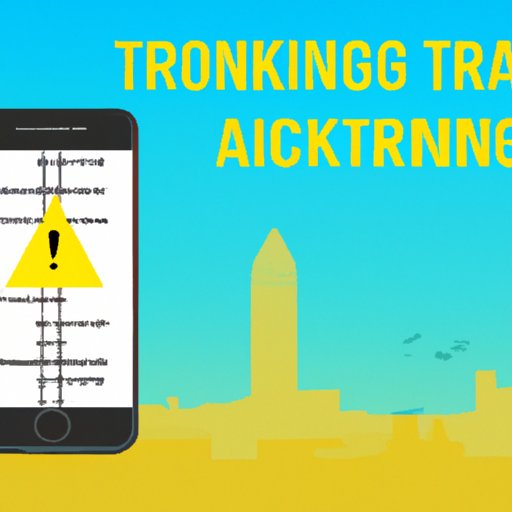
Introduction
Have you ever lost your phone or wanted to know where a loved one is? Or have you ever wondered if you could track someone through their phone number? Many people are interested in tracking phone numbers, but is it really possible? In this article, we will explore the truth about tracking phone numbers, discuss different methods for tracking, and provide tips on how to track a phone number safely and ethically.
The Truth About Tracking Phone Numbers: What You Need to Know
Before we dive into the methods for tracking phone numbers, it’s important to understand how phone tracking works. Phone tracking involves using the GPS (Global Positioning System) or cell tower triangulation technology to determine the location of a phone. GPS uses satellites to track the location of a phone, while cell tower triangulation uses the signals between a phone and nearby cell towers to estimate its location. Both methods require the phone’s GPS or location services to be turned on for tracking to work.
When it comes to the legality and ethics of tracking a phone number, it’s important to know that it can only be done legally with consent or a court order. Tracking someone’s phone number without their consent is illegal and can result in serious consequences, including fines and jail time. Ethically, it’s important to consider whether tracking someone is justified and respects their privacy.
It’s also important to note that phone tracking has limitations. It may not be accurate in areas with poor GPS or cell tower signals, and it can only provide an approximate location.
Can You Really Track a Phone Number? We Investigate
Now that we’ve covered the basics of phone tracking, let’s look at the different methods for tracking a phone number. As previously mentioned, there are mainly three ways to track a phone number: GPS location, cell tower triangulation, and software and apps.
GPS location is one of the most accurate ways to track a phone number, but it requires the phone’s GPS to be turned on and can only be done with consent or a court order. Some phone carriers also offer GPS tracking services for a fee, but again, consent is required.
Cell tower triangulation is less accurate than GPS location but can still provide an approximate location. It works by estimating the location of a phone based on the signals it sends and receives from cell towers in the area. This method can only be done with consent or a court order.
Software and apps are popular ways to track a phone number, but they vary in accuracy and reliability. Some popular phone tracking apps include Find My iPhone, Google Maps, and Life360. These apps allow you to track the location of a phone with the owner’s consent. Some software, such as mSpy and FlexiSPY, allow you to track a phone number without consent, which is illegal and unethical.
Overall, phone tracking is possible through different methods, but it’s important to use them legally and ethically and to understand their limitations.
The Practical Uses of Tracking Phone Numbers
There are various scenarios where tracking a phone number can be helpful. For example, if you lose your phone or it gets stolen, you can use a tracking service to locate it. Phone tracking can also be helpful in tracking the location of a loved one, such as a child or an elderly family member, to ensure their safety and well-being.
Phone tracking has also been used to solve crimes and assist in search and rescue missions. Law enforcement agencies use phone tracking to locate suspects or missing persons, and rescue teams use it to find hikers or climbers who are lost or injured.
Why You Should (or Shouldn’t) Track a Phone Number
As with any technology, there are pros and cons to phone tracking. On one hand, it can be helpful in finding a lost phone or tracking a loved one’s whereabouts for safety reasons. It can also be useful in solving crimes or locating missing persons.
On the other hand, phone tracking can be invasive and can easily be misused. It’s important to consider ethical considerations when tracking someone else’s phone number. Misusing phone tracking technology can have serious consequences, including legal and ethical ramifications.
Step-by-Step Guide on How to Track a Phone Number Safely
If you decide to track a phone number, it’s important to do it safely and legally. Here are some steps to follow:
- Make sure you have consent or a court order to track the phone number.
- Choose a reliable and reputable phone tracking app or software.
- Follow the app or software’s instructions for tracking the phone number.
- Protect your privacy and security by using two-factor authentication and regularly changing your passwords.
- Disable tracking services when they’re no longer needed.
Following these steps can help you track a phone number safely and ethically.
Conclusion
In conclusion, tracking a phone number is possible through different methods, but it’s important to use them legally and ethically. Phone tracking can be helpful in locating a lost phone, tracking a loved one’s whereabouts, or assisting in search and rescue missions, but it’s important to consider ethical considerations and protect your privacy and security. It’s also important to understand the limitations of phone tracking and use it as a last resort when all other methods have failed.
The future of phone tracking is uncertain, but it’s likely that technology will continue to evolve and become more accurate and reliable. As this happens, it’s important to remain vigilant and responsible when it comes to phone tracking.





